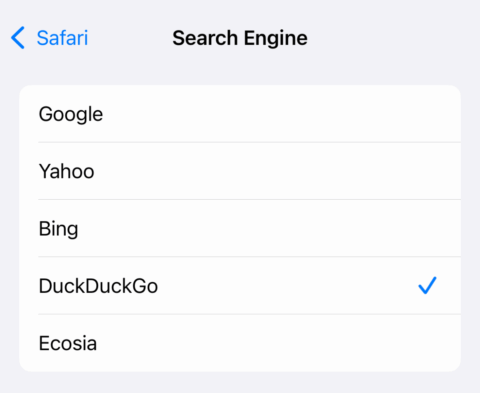If you search the web on your iPhone using Safari, chances are you’re also using Google. There are billions of reasons for that. Literally. Google reportedly pays Apple $20 billion annually to remain the default search engine across Apple devices. In return, Google itself profits to the tune of $50 billion annually from all the searches Apple users make on their iPhones, iPads, and Macs.
No wonder both companies get antsy when regulators start throwing around words like monopoly and antitrust. Maybe in the future we’ll be prompted to pick a search engine during setup, much like how EU users now pick a web browser. For now, though, if you want something different, you’ll need to dig into the Settings app yourself.
Head to Settings > Apps > Safari > Search Engine, and you’ll find Google alongside a handful of alternatives. That paltry selection perhaps further hints that Apple doesn’t really want you to change anything. But I’d grown tired of Google’s dominance and its search results being littered with advertising and AI. I was determined to try something new.
Yahoo felt like a relic. Bing is Microsoft, so… hard pass. That left two search engines known for efficiency, privacy, and having an ethical backbone: DuckDuckGo and the ‘green’ Ecosia. DuckDuckGo was first on the list, so I gave it a go.
Lost and found
The switch was more jarring than I expected. It immediately became apparent how much coddling Google does during every search. Years ago, it served up a simple list of results, ranked by relevance; today, Google wants to be an ‘information engine’ and crams results pages full of sometimes irrelevant clutter. Using DuckDuckGo was like revisiting an older internet that’s comparatively sparse, direct, and bereft of frills.
Each approach has its pros and cons. If you’re looking to buy something, DuckDuckGo’s clean list of links requires you to put in more effort. It’s a far cry from Google’s slick sponsored ads, with images and prices trying to tempt you to part with your cash.
Similarly, frame search terms as questions, and you really notice the difference. I’ve become irritated by Google’s increasing tendency to kick off results to such queries with lengthy (and inaccurate) AI summaries, followed by a slew of Reddit and Quora links. While DuckDuckGo also includes embedded AI, its output is less intrusive and can easily be turned off. Moreover, the links that follow are geared towards reputable, authoritative sources, rather than chatter from social media.
Whether you find this more useful may come down to context, and there were times I missed Google. For example, its city overviews, with weather forecasts, attraction links, and quick facts, are genuinely helpful. I also found DuckDuckGo noticeably inferior at surfacing relevant news. But I didn’t miss being buried in ads, junk content, and posts from the rotting remains of Twitter, aka X.
Make it personal
What also stood out is how DuckDuckGo seems keen to offer a search engine driven by what I want, rather than what a corporation wants to impose on me. Beyond switching off AI (including any AI pictures DuckDuckGo can identify) – nigh-on impossible in Google – you can tweak how search results look and behave, such as turning off infinite scrolling.
This thoughtfulness extends to the embedded Duck.AI. This chatbot is one of DuckDuckGo’s most controversial decisions, but the company insists it’s private and anonymized and that your inputs are never used to train AI models. You can customize its tone, response length, and other characteristics, and in use it feels… fine? Certainly less creepy than many rivals. Combined with the low-key way AI is presented in search results, DuckDuckGo hints at a more human future for AI – one that’s not so aggressive and in your face.
As for the experience as a whole, it – for better or worse – is like stepping back in time, albeit with the odd modern comfort. Google remains better at providing fast, packaged information. But DuckDuckGo made me again start to think about how I searched. I paid more attention to sources and enjoyed not being rapidly funneled straight to Reddit. This all felt refreshing, mindful, and less manipulative.
Notably, I haven’t switched back to Google yet. Maybe that’s down to the novelty or a creeping sense Google’s vision of the web doesn’t have my best interests at heart. So although DuckDuckGo isn’t better at everything, it might just be better for me. And it might be for you too.




